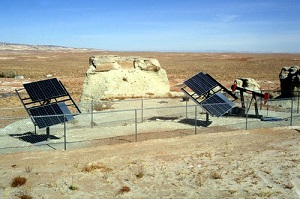Saudi Arabia invests in solar energy
 Saudi Arabia is investing in solar energy, despite having the world’s largest proven oil reserves. In 2008 the kingdom’s the kingdom’s Oil Minister, Ali al-Nuaimi, told Petrostrategies that "one of the most important sources of energy to look at and to develop is solar energy." He also stated that the country is researching how to make the country a center for solar research and become an exporter of solar power.
Saudi Arabia is investing in solar energy, despite having the world’s largest proven oil reserves. In 2008 the kingdom’s the kingdom’s Oil Minister, Ali al-Nuaimi, told Petrostrategies that "one of the most important sources of energy to look at and to develop is solar energy." He also stated that the country is researching how to make the country a center for solar research and become an exporter of solar power.
To meet the needs of future demand for solar power in the middle east, Saudi Arabia also is building industries related to photovoltaics (PV). First Energy Bank of Bahrain is building a $1 billion polysilicon plant. The plant is expected to become operational in 2013 and will refine silicon for use in PV.
So far, the kingdom’s most visible investment in solar is at the King Abdullah University of Science and Technology (KAUST), which was completed in 2009. The campus has a 2 megawatt (MW) PV array on its rooftop, which provides less than 6% of its total energy needs. However, it also has solar hot water heating, which meets all the campus’s hot water needs and the buildings use solar towers to help cool the desert campus. Plans are in the works for a 900,000 meter PV installation to provide all the campus’s energy needs.
The project was named one of the American Institute of Architects’ Top 10 Green Buildings in 2010. All told, the 496,000 square-meter project is the world’s largest to achieve LEED Platinum Certification, according to Construction Week.
Saudi Aradia also is developing PV-powered desalinization plants to handle the country’s water needs. The first one, being built now, is a 10 MW PV-powered desalination plant that uses reverse osmosis to remove salt from water.
“The solar energy scheme will reduce the cost of producing desalinated water and of generating power for use in the Kingdom,” said Prince Turki bin Saud bin Muhammad, King Abdulaziz City for Science and Technology (KACST) vice president. The country also has plans or is working on nine more PV-powered desalinization plants.
The kingdom receives about 7 kilowatts or solar power per square meter per day. And the country now plans to have between 7 percent and 10 percent of all its electricity coming from renewables by 2020.



